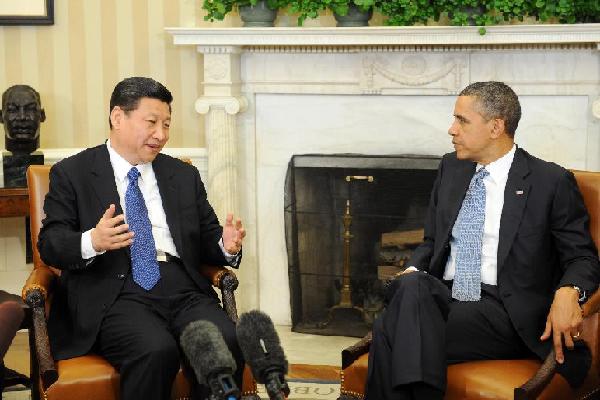Chinese vice-president's U.S. tour hailed as future-oriented landmark
- By Wu Liming, Qian Tong, Huo Xiaoguang
 0 Comment(s)
0 Comment(s) Print
Print E-mail Xinhua, February 19, 2012
E-mail Xinhua, February 19, 2012
|
Chinese Vice President Xi Jinping (L) meets with U.S. President Barack Obama at the White House in Washington, the United States, Feb. 14, 2012. [Xinhua/Xie Huanchi] |
REACHING POLITICAL CONSENSUS
Xi's visit has been designed in part to reduce the so-called strategic trust deficit between the world's largest economy and the fastest growing power in the Asia-Pacific region.
Washington has been concerned for years that a rising China might be a destabilizing force by challenging the existing international political and economic order. Beijing, meanwhile, has long feared that America might be seeking to contain China's rise.
There is no denying that divergences and disputes between the two countries still exist on many fronts that stand in the way of building strategic mutual trust between them.
During his meeting with Obama and Biden, Xi put forward several proposals to promote "strategic mutual trust" between the two countries, including respecting each other's core interests and accommodating each other's major concerns.
"The development of cooperative partnership could be guaranteed only when the two sides view each other's strategic intention and development path in a correct and objective way, respect each other's core interests and accommodate each other's major concerns, avoid making troubles for each other and do not cross over each other's bottom lines," Xi said.
Xi proposed that China and the United States make full use of various dialogue and consultation mechanisms to provide fresh impetus to forge their bilateral cooperative partnership.
During his meetings with Obama and Biden, Xi stood firm in upholding China's core interests.
Xi reiterated Beijing's position on the Taiwan issue and urged Washington to conform to the spirit of the three joint communiques underpinning the China-U.S. relations during his meeting with Obama.
The Obama administration last September notified the U.S. Congress of its decision to sell arms worth 5.85 billion U.S. dollars to Taiwan, including upgrades for 145 of Taiwan's fighter jets.
The move infuriated Beijing and was seen as the latest evidence of Washington's irresponsible nonchalance to China's core interests.
Though not speaking specifically about the arms sale to Taiwan, Xi called on the United States to safeguard, with concrete action, the peaceful development of relations across the Taiwan Strait and the overall development of China-U.S. ties, according to a press release issued by the Chinese delegation.
Xi said the Taiwan issue concerns China's sovereignty and territorial integrity, and remains, as always, the most important and most sensitive issue in China-U.S. relations.
Beijing appreciates Washington's repeated declaration of its commitment to the one-China policy, Xi said.
Obama, for his part, reiterated adherence to the one-China policy based on the three joint communiques.
The United States does not support any calls for "Taiwan independence," he said, adding that his country wants to see the peaceful development of cross-Strait relations move forward.
In talks with Biden, Xi said the Taiwan and Tibet issues concern China's core interests. He asked the United States to properly and cautiously handle those issues, so as to avoid damage and disturbances to the China-U.S. relations.







Go to Forum >>0 Comment(s)